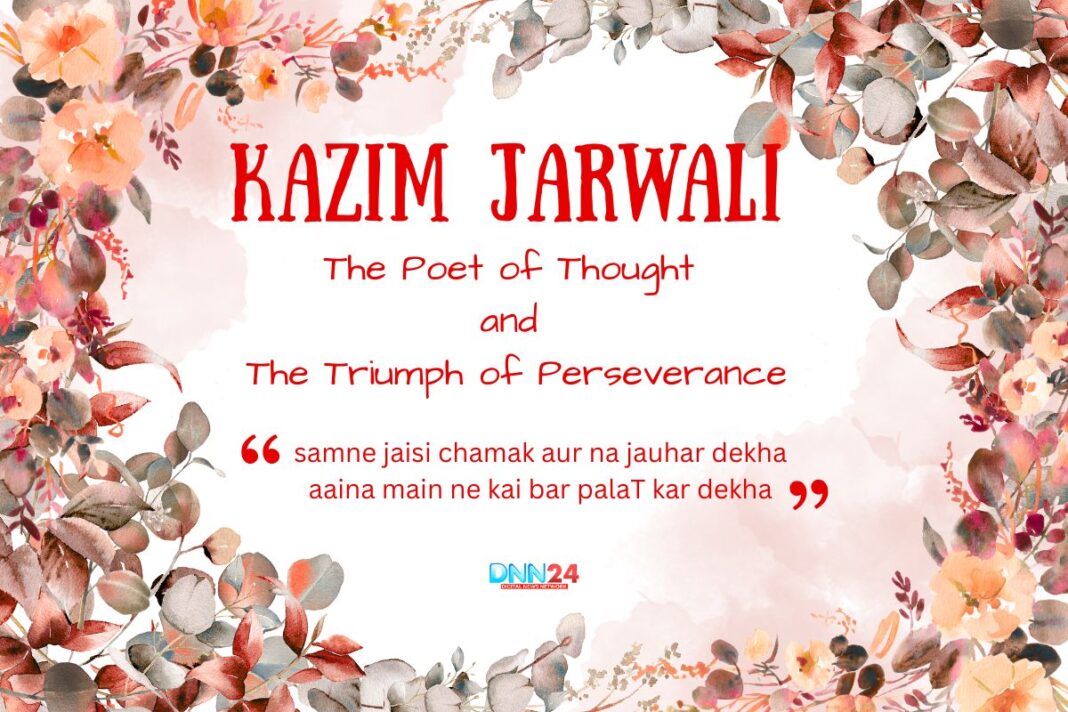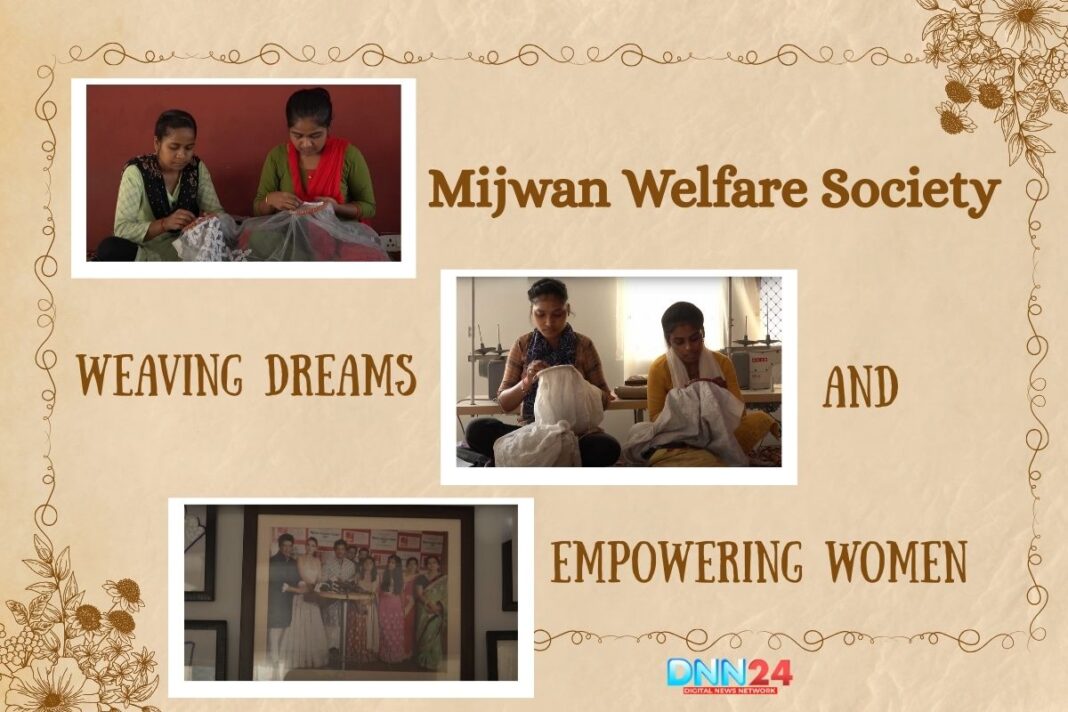Kazim Jarwali, born Syed Kazim Ali Rizvi on 15 June 1955 in Jarwal, near Lucknow, emerged not just from the soil of Uttar Pradesh but from a heritage heavy with courage and intellect. His father, Dr. Syed Imtiaz Ali Rizvi, was a freedom fighter, giving Kazim a legacy of resistance and resilience. His mother belonged to a landowning family of influence, and Kazim was exposed early to the hardships and privileges that defined independent India. Imbibed with the family values, he was initially educated in his hometown, where he developed into a student of promise.
KHushk honTon pe mere apne lab-e-tar rakh de
Kazim Jarwali
mere saqi mere sahra pe samundar rakh de
His educational career was exemplary; he obtained a Master’s degree in Arab Culture from Lucknow University and was a gold medalist, an accomplishment that became a prelude to the mastery he would soon exhibit in language and thought. But the real school, of Kazim, was the world itself: he imbibed the atmosphere of Lucknow–its tehzeeb, its poetry, its silent sorrow and glory. Here, a young man’s heart, Kazim, was taught to beat softly and violently, and the first sparks of poetry were kindled in him.
main dushmani hun mohabbat hun ajnabi hun main
Kazim Jarwali
yahi subut hain mere ki aadmi hun main
Struggles Unseen: The Years of Pain and Victory
The great poet had behind him a man who had tasted the gall of rejection and loneliness of the creative soul. While his lineage and education opened doors, Kazim Jarwali’s journey as a poet was neither quick nor easy. The Urdu poetry world is very competitive, especially when a person comes forth to challenge the traditions or come up with new ideas.
kahan kho gae hain sae wo ghane chinar wale
Kazim Jarwali
wo rawish rawish tarane hasin aabshaar wale
During his young years, Kazim experienced a feeling of doubt from the old guard who looked suspiciously at his young ideas. Mushairas, grand Urdu poet parties, were occasionally savagely competitive, and Jarwali left the venue with several bruises rather than applause more often than not.
lahu mein gharq adhuri kahaniyan niklin
Kazim Jarwali
dahan se TuTi hui surKH chuDiyan niklin
But the more he was rejected, the harder he grew. During the day, he was an educator at the Shia Post Graduate College, Lucknow, and during the night hours, he polished couplets that were bleeding with meaning and intensity. Poverty lay close at hand; the world of the Urdu poets is not generous, and there were many days when he had to be content with his dreams.
jab bhi qissa apna paDhna
Kazim Jarwali
pahle chehra chehra paDhna
However, Kazim’s poetry grew as a result of these experiences, and his poetry grew out of these experiences into universal laments of struggle and pain. His verses were full of the commoner’s pain– his upward struggles were not in leaps, but in patient steps.
sarabon se nawaza ja raha hun
Kazim Jarwali
amir-e-dasht banta ja raha hun
Unheard and Untold Stories: Turning Moments into Legends
Kazim Jarwali’s life sparkles with moments beyond the public record—fascinating anecdotes that reveal his emotional universe. One such story remains rarely spoken, shared only in hushed circles: After a stinging defeat at a poetry competition, a lonely young Kazim sat beneath a neem tree in Jarwal, weeping over a crumpled shair (couplet) that the judges mocked.
qafila ja ke usi dasht mein Thahra apna
Kazim Jarwali
KHud pe rakhte hain jahan peD bhi saya apna
Rather than succumb to resentment, he re-wrote the couplet–he found in his heartbreak the strength to turn rejection into art. That verse rewritten decades later would bring audiences to tears at a crowded Mushaira in Karachi, Pakistan, where the audience stood in respect to “Shair-e-Fikr”, the Poet of Thought.
hui hai saya-fagan sabr ki qaba mujh par
Kazim Jarwali
chalae tir kaho aa ke hur mila mujh par
Yet another favourite, less well-known episode of his teaching years. A student, struggling with the loss of a parent, received a handwritten nazm (poem) of hope from Kazim—a gesture that turned the student’s path toward success. Poetry to Kazim was not merely to be recited but to be lived; the ink on his page was nothing to the sympathy he exercised daily. These are short and powerful tales that speak what awards can never: Kazim is as big as he is a man and a writer.
hum andhere mein aa nahin sakte
Kazim Jarwali
apna saya miTa nahin sakte
The Rise of a Phenomenon: Writings that Echo Across Borders
Kazim Jarwali is most renowned for his deep, thoughtful poetry—his admirers call him “Shair-e-Fikr,” the Poet of Thought. He speaks Urdu, Hindi, Arabic, Persian, and English, so his literary works serve as a bridge between not only languages but also hearts. Kazim is a genius in developing classical forms, modernising them, and making them accessible. He has enlarged the Salam, a poetic elegy in memory of the Karbala tragedy, by inserting veils of imagination and philosophy and burning moral messages.
kahta hai mera azm ki do-gam chala hun
Kazim Jarwali
aur panw ye kahte hain ki sadiyon ka thaka hun
Such renowned works as Kitab-e-Sang, Kooche aur Qandeelein and Karwaan-e-Gham take one into a world where sorrow elevates and loss transforms into glowing poetry. His lines, such as Jab hawaon mein nami mehsoos ki Abbas ne, ehtiyatan saans apni rok li Abbas ne, are heart-melting and sweet but profound. The words of Kazim go round and round-India, Pakistan, Iran, Iraq, Kuwait, the UAE.
ye sach hai charaghan tha ujala bhi bahut tha
Kazim Jarwali
basti ko magar KHauf hawa ka bhi bahut tha
From television appearances (like his decade-long recitations for Doordarshan during Muharram) to standing ovations in grand mushairas, his voice resonates with all who hunger for meaning. Even with laurels, U.P. Urdu Academy Award, international honours, Kazim is a humble man and likes to remind his admirers of his oft-repeated saying, “Urooj-e-aadamiyat hai mizaje khaksari mai”–True greatness is in humility.
musafiran-e-ishq ko wo dasht wo dayar de
Kazim Jarwali
barahnagi ke ‘ahd mein jo chadar-e-ghubar de
Reflection and Inspiration: Lessons from a Life Lived for Poetry
Kazim Jarwali’s journey is a chronicle of personal achievement and a living handbook for anyone yearning to rise above defeat. His life story teaches that talent is inadequate without the hard-earned experience of humility, perseverance, and understanding. Whether it was academic, familial, or literary setbacks, Kazim opted to take that road of self-scrutiny and re-invention at each of these crossroads. He worked as hard at bringing up young poets and cheering students as he ever did in perfecting his own art.
faza-e-shahr ki nabz-e-KHiram baiTh gai
Kazim Jarwali
fasil-e-shab pe diya le ke sham baiTh gai
He was accessible even at the time of his most significant acclaim- his house was the refuge of struggling writers, and his heart was the open house to every seeker. The hidden story of Kazim Jarwali—the one not etched on awards or written in biographies—is the story of a man who built greatness not through privilege or genius alone, but by honouring the sacredness of struggle.
kash miTti hui KHushbu ko sahaara mil jae
Kazim Jarwali
shaKH se TuTe hue phul ka rishta mil jae
His poetry is born of wounds and wonder, and it brings light to the lives of so many others. In an age obsessed with quick fame, Kazim Jarwali stands as a beacon: the relentless artist, the healer with words, the humble champion of thought. His scars shall be his schooling and cross-stanzas, whose song shall never end.
Also Read: Talib Chakwali: A Life Woven in Words, Loss, and the Search for Meaning
You can connect with DNN24 on Facebook, Twitter, and Instagram and subscribe to our YouTube channel.



